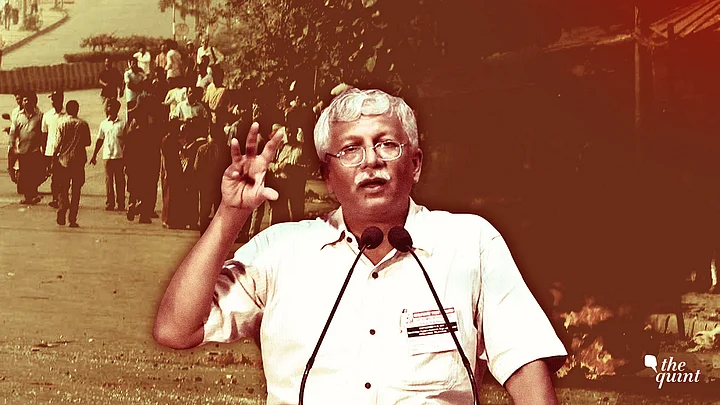With activist Vernon Gonsalves' deteriorating health that has led him to be admitted to JJ Hospital, Taloja jail authorities told a special National Investigation Agency (NIA) court, in Delhi on Monday, 12 September, that the accused in the Elgar Parishad case was under constant medical treatment in jail once his ill health came to light.
The 65-year-old activist, who was in judicial custody and lodged at the Taloja jail in Navi Mumbai, was on 8 September admitted to the state-run JJ Hospital, where he is undergoing treatment for dengue.
On the last hearing, Gonsalves’ lawyer and family members had alleged the jail authorities had delayed providing medical treatment to the activist and that he should have been admitted to the hospital in central Mumbai long back.
'Only Being Given Paracetamol and Antibiotic Tablets'
Advocate Larsen Furtardo had filed an affidavit before the special NIA court, saying that he had taken a “legal interview” of some of the co-accused of the activist inside the prison on 7 September.
During the interview, the co-accused had said that the health condition of Gonsalves was visibly getting bad and he was only being given paracetamol and antibiotic tablets, the affidavit said.
The special court had then asked the superintendent of the Taloja jail to submit a report to it. Accordingly, the superintendent submitted the report, through special public prosecutor (SPP) Prakash Shetty, on Monday.
The SPP told the court that continuous medical treatment was given to Gonsalves once the jail authorities came to know about his deteriorating health.
The jail superintendent, in his report, has given a chronology of developments related to the activist.
Chronology of Developments
The prison hospital was not informed about Gonsalves' ill health till 31 August, the report said.
Two days later, the accused visited the jail hospital with complains of fever and headache and was given medicines, the superintendent maintained.
On 3 September, the prison's medical officer visited Gonsalves in his barrack and gave him the required medicines. The following day, the medical officer visited him again and this time administered him an injection, said the report.
On 5 September, as his fever was not subsiding, a rapid malaria test was conducted, which came out negative. He was asked to get admitted to the jail hospital, but he refused, the report said.
Further, in his report, the jail superintendent said that on 6 September, the blood sample of the accused was collected and he was also checked by a physician (Doctor of Medicine or MD) from a hospital in the nearby Panvel city.
Based on the visiting physician's advice and following further discussion with the chief medical officer of the prison, guards were called and Gonsalves was taken to JJ Hospital in central Mumbai.
He was sent back to the jail from JJ Hospital after treatment. A day later (7 September), his blood test report was received and the activist was diagnosed with dengue, but the accused could not be shifted to the hospital as guards were not available to escort him due to the Ganpati festival, said the superintendent.
Finally, on 8 September, Gonsalves was admitted to the government-run hospital where he is still undergoing treatment for the mosquito-borne disease, said the report.
The jail authorities also told the court that a report on Gonsalves' health condition was sought from the JJ Hospital, but since 10 and 11 September were holidays, it has not been received yet.
The medical report of the accused will be presented before the court as and when it will be made available by the hospital, they said.
Meanwhile, the special court on Monday permitted Gonsalves' wife, Susan Abraham, and his brother to meet him in the hospital daily for 30 minutes.
The activist's plea for temporary bail on medical grounds is likely to be heard by the court on Tuesday.
The case relates to the alleged inflammatory speeches delivered at the 'Elgar Parishad' conclave, held at Shaniwarwada in Pune on 31 December 2017, which police claimed triggered violence the next day near the Koregaon-Bhima war memorial located on the outskirts of the western Maharashtra city, around 200 km from Mumbai.
One person was killed and several others were injured in the violence.
The case, in which over a dozen activists and academicians have been named accused, was initially probed by the Pune police and later taken over by NIA.
(With inputs from PTI.)
(At The Quint, we question everything. Play an active role in shaping our journalism by becoming a member today.)
